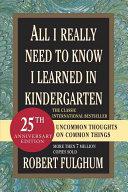“It doesn’t matter what you say you believe - it only matters what you do.”
Source: All I Really Need to Know I Learned in Kindergarten

All I Really Need To Know I Learned in Kindergarten is a book of short essays by American minister and author Robert Fulghum. It was first published in 1986.
“It doesn’t matter what you say you believe - it only matters what you do.”
Source: All I Really Need to Know I Learned in Kindergarten
“It’s almost impossible to go through life all alone.”
All I Really Need to Know I Learned in Kindergarten (1986)
Context: There’s another thing not everyone figures out right away: It’s almost impossible to go through life all alone. We need to find our support group — family, friends, companion, therapy gatherings, team, church or whatever. The kindergarten admonition applies as long as we live: “When you go out into the world, hold hands and stick together.” It’s dangerous out there — lonely, too. Everyone needs someone. Some assembly is always required.
“It wasn’t in books. It wasn’t in a church. What I needed to know was out there in the world.”
Source: All I Really Need to Know I Learned in Kindergarten
“Speed and efficiency do not always increase the quality of life.”
Source: All I Really Need to Know I Learned in Kindergarten
“People won’t share or play fair if you hit them.”
All I Really Need to Know I Learned in Kindergarten (1986)
Context: A six-year-old will not understand that “By and large it has been demonstrated that violence is counterproductive to the constructive interaction of persons and societies.” True. But a child can better understand that the rule out in the world and in the school is the same: Don’t hit people. Bad things happen. The child must understand this rule is connected to the first rule: People won’t share or play fair if you hit them.
“We can do no great things; only small things with great love.(mother Teresa)”
Source: All I Really Need to Know I Learned in Kindergarten
“Don’t hit people. Bad things happen.”
All I Really Need to Know I Learned in Kindergarten (1986)
Context: A six-year-old will not understand that “By and large it has been demonstrated that violence is counterproductive to the constructive interaction of persons and societies.” True. But a child can better understand that the rule out in the world and in the school is the same: Don’t hit people. Bad things happen. The child must understand this rule is connected to the first rule: People won’t share or play fair if you hit them.
“Maybe we should develop a Crayola bomb as our next secret weapon. A happiness weapon.”
All I Really Need to Know I Learned in Kindergarten (1986)
Context: Maybe we should develop a Crayola bomb as our next secret weapon. A happiness weapon. A Beauty Bomb. And every time a crisis developed, we would launch one. It would explode high in the air — explode softly — and send thousands, millions, of little parachutes into the air. Floating down to earth — boxes of Crayolas. And we wouldn't go cheap either — not little boxes of eight. Boxes of sixty-four, with the sharpener built right in. With silver and gold and copper, magenta and peach and lime, amber and umber and all the rest. And people would smile and get a little funny look on their faces and cover the world with imagination instead of death. A child who touched one wouldn't have his hand blown off.
“Sticks and stones may break our bones, but words will break our hearts.”
Source: All I Really Need to Know I Learned in Kindergarten (1986)
Context: Yelling at living things does tend to kill the spirit in them. Sticks and stones may break our bones, but words will break our hearts.
“Anything not worth doing is worth not doing well.”
Source: All I Really Need to Know I Learned in Kindergarten
“And good neighbors make a huge difference in the quality of life. I agree.”
Source: All I Really Need to Know I Learned in Kindergarten
Source: All I Really Need to Know I Learned in Kindergarten (1986)
Context: Take any one of those items and extrapolate it into sophisticated adult terms and apply it to your family life or your work or your government or your world and it holds true and clear and firm. Think what a better world it would be if we all — the whole world — had cookies and milk about three o’clock every afternoon and then lay down with our blankies for a nap. Or if all governments had as a basic policy to always put things back where they found them and to clean up their own mess.
And it is still true, no matter how old you are — when you go out into the world, it is best to hold hands and stick together.
"Credo" at his official website http://robertfulghum.com/index.php/fulghumweb/credo/; this may be partly influenced by remarks of Albert Einstein in "What Life Means to Einstein: An Interview by George Sylvester Viereck" The Saturday Evening Post (26 October 1929): I am enough of an artist to draw freely upon my imagination. Imagination is more important than knowledge. Knowledge is limited. Imagination encircles the world.
Source: All I Really Need to Know I Learned in Kindergarten